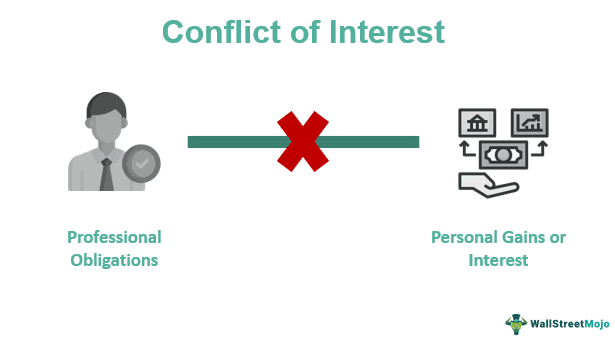Table Of Contents
Conflict Of Interest Meaning
Conflict of interest can be referred to as the situation where an individual's or organization's personal interests compromise their professional interests or duties. It's a common scenario that often has legal implications. The root cause of such a conflict is an individual or organization's vested interests, like money, power, relationships, etc.

This scenario can be seen in businesses, legal establishments, and workplaces. This clash of interests makes an entity unreliable. The major issue with personal vested interests is that they can cloud a person's judgment and interfere with decision-making. As a result, they hamper a system's efficiency and development.
Key Takeaways
- A conflict of interest is a clash or difference between an individual or organization's private and professional interests. This might prevent the entity from discharging its professional duties and obligations.
- Such situations can be seen in business, courts, and many forms within an organization.
- Most conflicts can be either financial or non-financial. It can be further classified into self-dealing, insider trading, gift issuance or acceptance, and nepotism.
- Often, dealing with such conflicts depends on the individual's ethics and morals. It reflects their self-discipline and professional principles.
Conflict Of Interest Explained
Conflict of interest is a common phenomenon seen in many official settings. For example, in business and law, there are many instances where individuals might be in a position where they might form a bias due to their interests taking over professional ones.
Conflict of interest in business occurs in many forms - within and outside the organization. Inside an organization, it might have to do with how a person behaves with a subordinate or colleague. On the other hand, an individual might get involved in transactions outside the organization that can negatively impact it.
Similarly, conflict of interest in law implies a lawyer's influence, which prevents them from giving their clients the right advice. In some cases, judges, too, have conflicts of interest.
Usually, organizations take many measures to avoid such conflicting interests from affecting the company's operations. Sometimes, individuals in powerful positions often withdraw or recuse themselves from cases where they have vested interests.
Types
Conflict of business interests can be briefly classified into financial, non-financial, and a conflict of roles.
#1 - Financial Conflicts
Examples of financial conflicts include self-dealing and insider trading.
Self-dealing is probably the most common type of conflict of interest at work. It is a situation where people in powerful positions or top management try to conduct transactions for personal benefit. For example, the production manager of a company enters into a contract with a certain company that promises to pay him a 10% commission.
People with access to confidential corporate information sell this information to external parties, like a sales manager selling customer details to competitors, which is an example of insider trading.
#2 - Non-Financial Conflicts
Examples of non-financial conflicts include gift exchange and nepotism. Executives give and receive gifts from people outside the organization who might interfere with the professional obligations of the executive. For instance, a company's CFO accepts gifts from a competitor's CEO.
Often, people in power might hire or give unfair advantages to those with whom they share a personal relationship. This is referred to as nepotism. For example, the manager's nephew gets hired despite not participating in the recruitment process.
#3 - Conflict of Roles
A person working for two organizations at the same time which has contradictory goals or interest is a typical case of conflict or roles. The person has to act or make decisions on behalf of an organization. This can ruin the interest of the other.
Most conflicts of interest have legal ramifications. For example, Self-dealing and insider trading are illegal and could lead to job loss, and the individual would have to compensate the victim. But nepotism and gift exchanges, though unethical, are not considered illegal. Therefore, it depends on the management's discretion to deal with these unethical issues.
Examples
Let's discuss some examples of conflict of interest.
Example #1
Consider a simple example of Ryan, the HR manager of the company XYZ. The company is looking to recruit a data analyst. The selection process involves an aptitude test, a psychometric test, and an interview. Finally, the employees are awarded definite scores out of 100 based on their performance.
John, who is Ryan's friend, applies for the job. He receives a score of 70. Despite some candidates receiving a higher score than John's, Ryan offered the position to John. Here, Ryan has failed to carry out his professional duties by letting his interests interfere with his job.
Example #2
Here's recent news about the United States Securities and Exchange Commission (U.S. SEC) warning brokerages and money managers to take measures that will eliminate conflicts of interest. On August 03, 2022, the SEC informed that disclosing vested interests arising from employees' compensation and incentives would not be sufficient. Instead, brokerage firms should go beyond and mitigate such potential conflicts of interest.
How To Avoid?
When a conflict of interest arises, it could lead to disagreement in research, disputes at the workplace, and raise challenges in different areas of life as well. Hence, it is important to ensure no conflict of interest arises where one has the option to balance or manage it. Here are a few ways in which such issues can be avoided:
- Identifying the issues that may raise such problems in the future, at an early stage.
- Ensuring no decision is made, considering private interest.
- Spreading awareness regarding situations that may raise conflicts of interest. This also helps build strong understanding with the people or participants involved in the process.
- Conducting training to make people aware of the measures that can help manage or avoid any kind of conflicts of this nature.
- Hiring third-party for decision-making in business and not involving in it as an individual. This will help people believe in the decisions being made.
